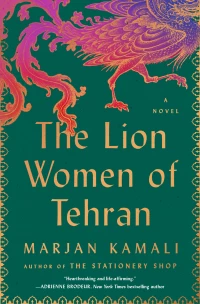
I stood on the lacquered oor—a small woman in black with a rectangular name badge on my chest. My coied, contented look was calculated so I’d appear not just satised but quietly superior. In America, I’d learned the secret to being a successful salesperson was to act like one of the elite, as if spritzing perfume on customers’ blue-veined wrists were doing them a favor. A sea of haughty New Yorkers swerved to avoid my spray. Thank God for the more down-to-earth women—the cooks and bakers coming up to the rst oor from the basement home goods section—they were too polite to reject the fragrant droplets I oered. Orange, lily, jasmine, and rose notes nestled in the lines of my palms and the bers of my clothes. “Look at you, Ellie! Soon you’ll take over this whole brand. I better watch my back!” My friend and coworker Angela, returning from her cigarette break, sidled up and whispered in my ear. The scent of her Hubba Bubba gum couldn’t hide the smoke on her breath. I shivered at the reek of tobacco. The bitter, sour notes would forever remind me of one long-ago night in Iran. The night when an act of betrayal changed the entire course of my friendship with Homa and both of our lives. From the moment I’d read Homa’s letter last night, I’d been a wreck. I batted away Angela’s compliments, said I wasn’t doing all that well, really, and that I had a headache because I hadn’t eaten all day. “I just might faint,” I added with a touch of melodrama. It was a relief when Angela was whisked away by a needy customer. My mother always said the envy of others invites the evil eye to cast doom on us. She’d often told me that being perceived as too competent, happy, or successful could summon misfortune. I knew belief in the powers of other people’s jealousy and the jinxing of an evil eye needed to be cast o. But at the age of thirty-eight, in the middle of that massive Manhattan department store, I was still unwittingly beholden to superstition. The truth of who I was could not be escaped. Nor could the aw I had spent years trying to quash and erase. The guilty one had always been me.
Earlier that morning, in our apartment on the Upper East Side of Manhattan, my husband, Mehrdad, had tried to comfort me with breakfast. He prepared toast with feta cheese and cherry jam. He brewed bergamot tea. But I couldn’t eat or drink. The jam was made from Homa’s recipe. The bergamot tea in the white teapot adorned with two pink roses reminded me of her. With the arrival of her letter, her absence dominated my life all over again. When I had rst seen the red-and-blue-bordered airmail envelope, I’d assumed it was from Mother and would contain the usual mix of laments and updates about the dangerous political situation in Iran. I knew those letters were probably opened and read by regime forces, but my mother often didn’t care and wrote bluntly: Aren’t you lucky, Ellie? You left and escaped the violent demonstrations and deafening riots. You skipped our country’s slide back into medieval times. Women have lost decades, no, centuries, of rights in this country. I’m glad you’re sitting comfortably with your professor husband in America. Thank goodness you got out! But when I pulled the onionskin paper from the envelope and unfolded it, my heart almost stopped. For there on the page was the unmistakable curlicue handwriting of my old friend, Homa. As girls, we’d sat on the same elementary school bench in downtown Tehran. Together we scratched out hopscotch grids in our neighborhood alley and raced to school with satchels bouncing against our hips. With Homa, I had zigzagged through the mazes of the Grand Bazaar and shared ice cream sandwiches and dreams for the kind of women we’d become. In her stone kitchen, I learned to cook. With her hand in mine, I jumped over the largest bonres. When we’d hiked up Alborz Mountain and seen Tehran laid out beneath us, it felt like the world could be entirely ours. Until one moment of striking carelessness ruined it all. For the past seventeen years, we had been ghaar—purposefully estranged— with no contact save one unplanned encounter. Now her letter was in my hands. How did she know where to nd me? She must have gotten my address from Mother. One page of Homa’s letter was lled with questions about my life in America. And another was about her situation in Iran. Her health was good (pressure in the sinuses but nothing more), the weather (cold and yet delicious in the mountains—remember the teahouse we went to?) was tting for the season, her job as a teacher kept her busy. But her mind was not at ease (You wouldn’t recognize this country, Ellie. I don’t know where we went wrong). At the bottom wasa sentence about Bahar, her daughter, and how she loved to sing. She closed the letter with Can you call me, Ellie? Please. My number is 272963. I need to speak to you. It’s urgent. After I told Mehrdad about the letter, he held me close and said gently, “It’s good she’s reached out. You were the best of friends. Time to air it all out, Ellie. Speak to her.” How I wish it were so simple. I couldn’t blame Homa for cutting contact. But now she had own back into my life all innocence and zest, creating a crater of questions with her signo. It’s urgent.







